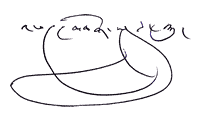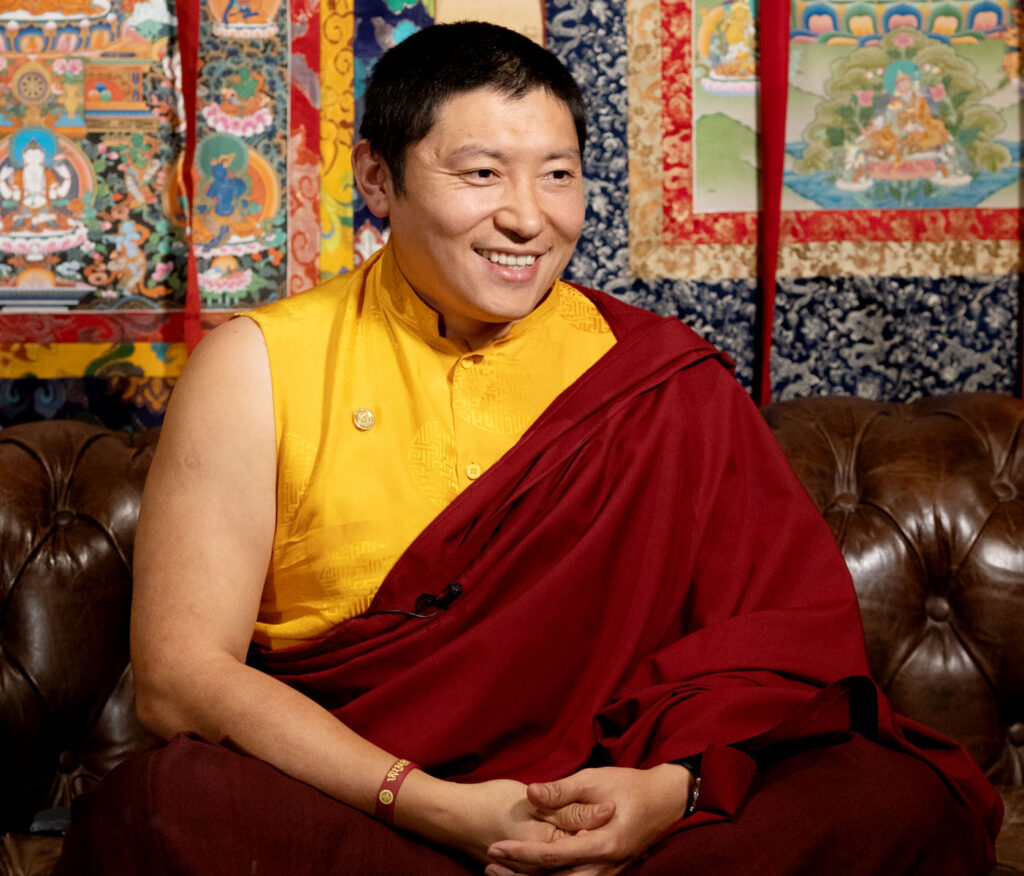Dear friends near and far
Greetings to you all on this Guru Rinpoche Day. I hope you’ve all been healthy and happy. We all want to be happy. This is our fundamental aim in life, right? But often we find it difficult to achieve. When we don’t know how to deal with our own emotions and our mind, life can become very tiring and depressing. On top of that, most of us are so busy these days, which makes us even more stressed and uptight. So here I would like to share with you three simple methods that help me deal with my emotions. These practices give me comfort.
1. Creating Space
These days we have so many things to think about: our health, our family, our work, and if you’re a dharma practitioner, then on top of all that you have meditation and dharma practice to worry about. When we don’t know how to deal with them, these worries can make our minds start to slowly shrink, becoming more and more narrow, and as a consequence more and more negative. Sometimes things start to overwhelm us and we feel trapped physically. Our chest feels tight and then we let out a big sigh in an attempt to relieve ourselves of these feelings. That happens sometimes. A small problem can come to seem so big that we can’t deal with it at all.
A really good way to deal with this is to create space mentally. It helps relieve the tension and uptightness in your mind and in your body as well. Creating space is a very simple method. It’s not a Buddhist teaching or anything like that. It’s simply a technique we can apply to give ourselves space, freedom and relief from all our worrisome thoughts.
How to create space? When you have a few minutes, look ahead of you and simply imagine that you’re surrounded by empty space in all directions. Sometimes it is useful to look at the empty sky. Just imagine space everywhere: no walls, no boundaries, no buildings, nothing. And don’t start thinking about work, family, or things you need to do. Simply imagine that everything is just like the vast, open sky, like empty space, and let your mind blend into the space so that it becomes just as vast and open. You can close your eyes if that helps. Imagine this spaciousness for a short while. After a minute or two you’ll start to really feel spacious mentally. Your chest will open up and you’ll feel relieved of all those tensions and thoughts that were crowding in on you just a few minutes ago. Your mind opens up and then your way of thinking changes, just like that. It takes just five or ten minutes and is so easy—that is the magic of creating space. You don’t have to believe me. Try it for yourself and you’ll see.
2. Knowing Your Own Faults and Reducing Judgment
We all want to be happy, right? Yes or no? But what is our mind occupied with most of the time? Negative emotions, negative judgments, and negative thoughts. Look at your own mind and see the pattern of emotions. How many of them are negative? Have you ever before given this a moment’s thought?
So what you need to do first is to recognize your thought-patterns, your negative emotions and the way they arise: the way different feelings arise. Recognize and notice, but don’t judge! There’s a big difference between noticing and judgment. Noticing is simply recognizing and becoming aware of something: “Oh, yes, I have a problem with jealousy.” But judgment goes one step further—a step too far—and starts criticizing: “Oh, yes, I have a problem with jealousy. Oh my God, I’m such a bad person. I can’t believe I made that mistake! Oh, I feel so awful. I can’t bear it!” Do you see the difference? Judgment has these emotional ties whereas noticing does not. So try to simply notice your faults and not judge.
The problem nowadays is not that people are not doing dharma or other spiritual practice and trying to improve. The problem nowadays is that we don’t notice and accept our own faults; so then of course we don’t improve, no matter how we might try. It’s a bit like taking medicine for an illness when you don’t even know what illness you have. So please give this a moment’s thought. Look honestly at yourself and acknowledge your own faults and mistakes.
3. Compassion and Loving Kindness
The third key I’d like to mention here is having compassion and loving-kindness. Traditionally speaking, in the Buddha’s teaching, compassion is defined as the wish for beings to be free from suffering and the cause of suffering and loving kindness is the wish for beings to have happiness and the cause of happiness. Here though, I’d like to explain compassion as a basic understanding or empathy for others and loving kindness as having a good, kind heart.
Understanding is so important. For example, in order for a family to be happy and harmonious the parents need to understand their children, they need to be able to see things from their point of view, and the children also need to understand their parents. It’s the same in all situations, in the office, school, relationships, and so on. We need to share with each other, get to know each other well, and learn to look at things from others’ perspectives; we need to put ourselves in their shoes. If somebody is shouting at you, do you think he’s happy? Do you think he’s enjoying that? No, he’s upset, stressed, and angry, and later on he might well feel a lot of regret for what he’s doing right now. Yes, many people make mistakes, but do you think they do so intentionally? Do you think they do so because they’re happy? No. So try to understand that instead of just reacting with more anger and judgment from your side. If you can do that, you’ll feel compassion.
Another aspect of compassion is that if you come to understand your own problems and gain some freedom from them, naturally compassion towards others will arise. On the other hand, when you don’t clearly notice your own problems in the first place and know what suffering you have then how can you have compassion for others? How can you wish others to be free from that suffering, suffering that you don’t even recognize clearly yourself? So first you need to see your own problem. How? When you create space, the first key, and gain some freedom from your stress and the onslaught of thoughts, you see what you’re getting out from; you see the benefits and how you become happier. From just the first point, creating space, you think, “Oh, my boss, poor guy. If he knew this method he would be in a much better place than he is now. The poor guy.”
When you have this kind of compassion, your mind becomes more and more loose. When you focus more on others, you are indirectly reducing the focus on your ego and as a result your mind then becomes more and more relaxed, more expansive, and then more intelligent.
You can share these three points with anyone. It’s going to benefit them, not harm them. So these are the three keys to be happy.
Sending you all much love and affection.
Sarva Mangalam,

Phakchok Rinpoche






Responses